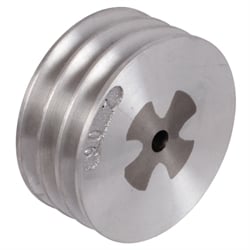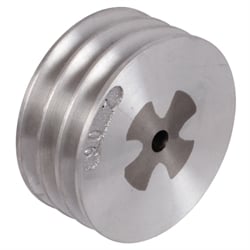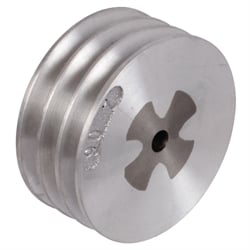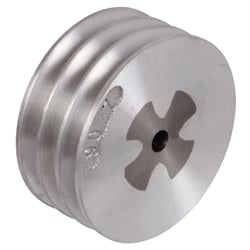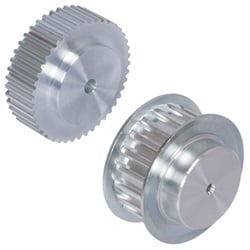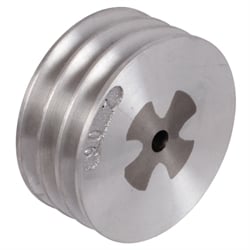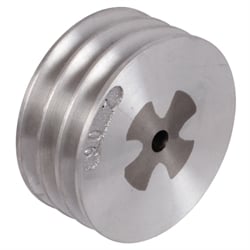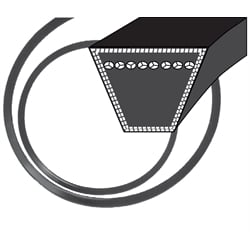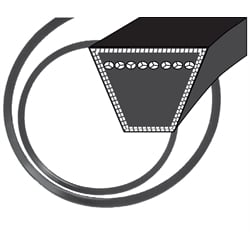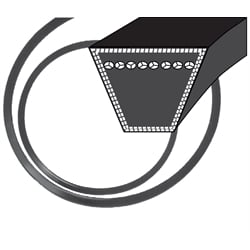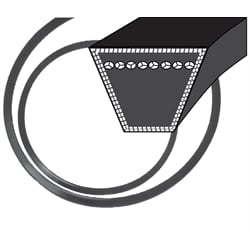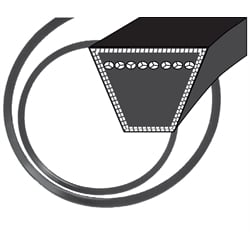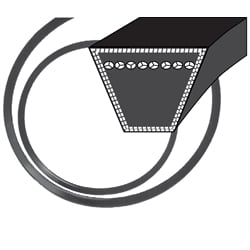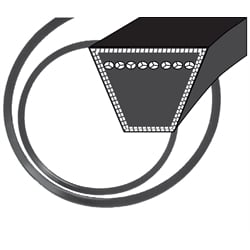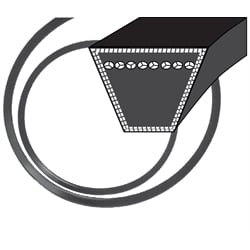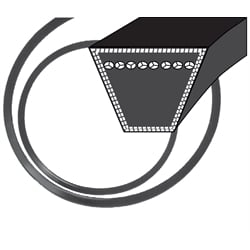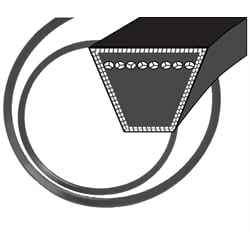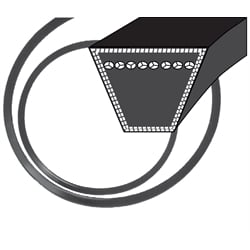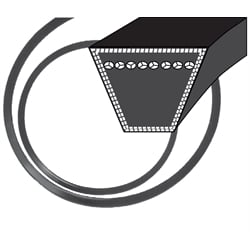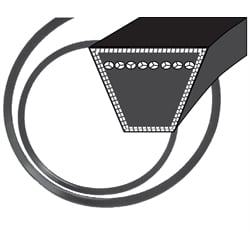Timing belt and pulley
Description
Timing belt drives ensure quiet operation and synchronous power transmission. Because they are maintenance-free, these drives are highly cost-effective. Due to changing requirements and considering the latest developments, there are a large number of different profiles, belt types, and pulleys available on the market. When non-positive drives (e.g., V-belt systems) are replaced, it is worth considering whether a conversion to a positive power transmission can be allowed from a safety perspective (some drives require slipping under overload). Selection and Sizing: The material of the belt and the type of timing belt must be chosen with consideration for the specific situation (e.g., required characteristics related to the machine or the environment). There are performance tables and a user-friendly calculation program to assist you in selecting the correct size. Small pulley diameters shorten the lifespan, and at least 6 teeth should be engaged at all times. When consulting the performance tables, various application-specific operating factors should be taken into account. Installation and Maintenance: At least one pulley must be equipped with flanges. The shafts must be parallel (deviation < +0.5°). The belt should not be overloaded during installation. Adequate adjustment options in the system should be provided for the assembly and adjustment of the ideal belt. Belt Tension: Each belt requires a certain pretension, depending on the type of belt, pulley diameter, center distance, and the tangential force to be transmitted. The total sum of tension and peripheral force should not exceed the allowed tensile strength of the belt. Belt tension is best adjusted by changing the center distance. Alternatively, a smooth idler pulley on the outside or a toothed one on the inside of the belt can be used for adjustment. Efficiency: Depending on the type of belt (flexibility) and the number of teeth on the pulley (bending), the efficiency can reach 98%. Belts with tension cords made of fiberglass (HTD and Inch) are particularly flexible.
Selection and sizing
The belt material and timing belt type must be chosen taking into account the specific situation (e.g. required characteristics related to the machine or the environment). There are performance tables and an easy-to-use calculation program to help you select the right size. Small pulley diameters shorten lifetime. And at least 6 teeth must be engaged at any time. When consulting the performance tables, several application-specific operating factors must be taken into account.
Assembly and maintenance
At least one pulley must be equipped with flanges. The axes must be parallel (deviation < +0.5°). The belt must not be overloaded during installation. For mounting and adjustment of the ideal belt, sufficient adjustment options must be provided in the system..
Belt tension
Each belt requires a certain pretension, depending on the type of belt, the diameter of the pulleys, the center distance and the tangential force to be transmitted. The total sum of the tension and the peripheral force must not exceed the permitted tensile force of the belt. The belt tension can best be adjusted by changing the center distance. Otherwise, a smooth idler pulley on the outside or a toothed one on the inside of the belt can be used for adjustment..
Efficiency
Depending on the type of belt (flexibility) and the number of teeth on the pulley (bending), the degree of efficiency can reach 98%. Belts with tensile bands made of fiberglass cords (HTD and Inch) are particularly flexible..
Some products in this category
| Products | ||
|---|---|---|
|
15431800
Maedler V-belt pulley material aluminium profile XPB, SPB and B (17) 3 grooves nominal diameter 180mm |
||
|
15432000
Maedler V-belt pulley material aluminium profile XPB, SPB and B (17) 3 grooves nominal diameter 200mm |
||
|
15432200
Maedler V-belt pulley material aluminium profile XPB, SPB and B (17) 3 grooves nominal diameter 224mm |
||
|
15432500
Maedler V-belt pulley material aluminium profile XPB, SPB and B (17) 3 grooves nominal diameter 250mm |
||
|
16224000
Maedler Timing belt pulley T5 material aluminium 40 teeth for belt width 10mm 21 T5/40-2 |
||
|
15432800
Maedler V-belt pulley material aluminium profile XPB, SPB and B (17) 3 grooves nominal diameter 280mm |
||
|
15433100
Maedler V-belt pulley material aluminium profile XPB, SPB and B (17) 3 grooves nominal diameter 315mm |
||
|
15460600
Maedler V-belt profile B (17) LR 690mm inner length 650mm |
||
|
15460700
Maedler V-belt profile B (17) LR 710mm inner length 670mm |
||
|
15460800
Maedler V-belt profile B (17) LR 750mm inner length 710mm |
||
|
15460900
Maedler V-belt profile B (17) LR 790mm inner length 750mm |
||
|
15461000
Maedler V-belt profile B (17) LR 815mm inner length 775mm |
||
|
15461100
Maedler V-belt profile B (17) LR 840mm inner length 800mm |
||
|
15461300
Maedler V-belt profile B (17) LR 876mm inner length 836mm |
||
|
15461400
Maedler V-belt profile B (17) LR 890mm inner length 850mm |
||
|
15461600
Maedler V-belt profile B (17) LR 940mm inner length 900mm |
||
|
15461700
Maedler V-belt profile B (17) LR 965mm inner length 925mm |
||
|
15461800
Maedler V-belt profile B (17) LR 990mm inner length 950mm |
||
|
15462000
Maedler V-belt profile B (17) LR 1015mm inner length 975mm |
||
|
15462100
Maedler V-belt profile B (17) LR 1040mm inner length 1000mm |
||
| Product | DESCRIPTIOn |
PICTURE |
|---|---|---|
|
15431800
Maedler |
V-belt pulley material aluminium profile XPB, SPB and B (17) 3 grooves nominal diameter 180mm |
|
|
15432000
Maedler |
V-belt pulley material aluminium profile XPB, SPB and B (17) 3 grooves nominal diameter 200mm |
|
|
15432200
Maedler |
V-belt pulley material aluminium profile XPB, SPB and B (17) 3 grooves nominal diameter 224mm |
|
|
15432500
Maedler |
V-belt pulley material aluminium profile XPB, SPB and B (17) 3 grooves nominal diameter 250mm |
|
|
15432800
Maedler |
V-belt pulley material aluminium profile XPB, SPB and B (17) 3 grooves nominal diameter 280mm |
|
|
15433100
Maedler |
V-belt pulley material aluminium profile XPB, SPB and B (17) 3 grooves nominal diameter 315mm |
|
Would you like to get your best price or more information about this product?
Machine builders or engineering companies can request a login via the link below or contact us immediately.
Are you a private customer?
The manufacturer or importer of your machine probably has the necessary parts. We therefore recommend contacting them first.
